An Analysis of Social Media's Impact on Mental Health and Wellbeing
VerifiedAdded on 2023/01/19
|8
|2461
|36
Essay
AI Summary
This essay investigates the detrimental effects of social media usage on mental health, particularly among adolescents. The paper synthesizes findings from various studies, including research by Kelly et al., Twenge et al., and Woods & Scott, to demonstrate the correlation between increased screen time and psychological issues such as depression, anxiety, low self-esteem, and sleep disturbances. It examines the role of social media in fostering FOMO (fear of missing out) and online harassment, which contribute to reduced psychological well-being. The analysis reveals that excessive social media use is associated with negative outcomes like body image dissatisfaction and decreased life satisfaction, particularly for girls. The essay concludes by emphasizing the importance of reducing social media consumption to mitigate these adverse effects, and highlights the broader implications of technology on mental health. The essay is a comprehensive overview of the issue, drawing upon multiple sources to support its claims and provide a nuanced understanding of the complex relationship between social media and mental well-being.
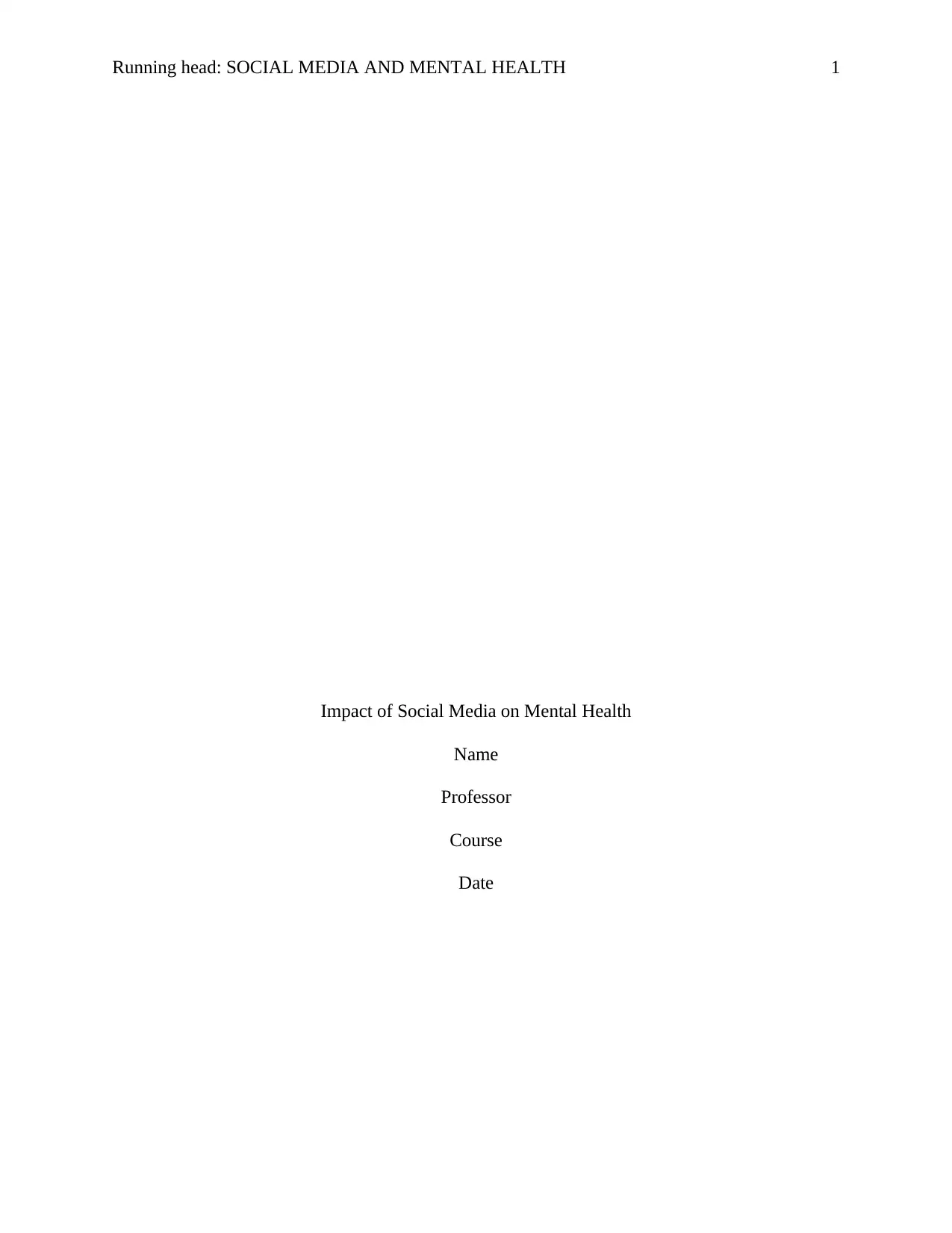
Running head: SOCIAL MEDIA AND MENTAL HEALTH 1
Impact of Social Media on Mental Health
Name
Professor
Course
Date
Impact of Social Media on Mental Health
Name
Professor
Course
Date
Paraphrase This Document
Need a fresh take? Get an instant paraphrase of this document with our AI Paraphraser
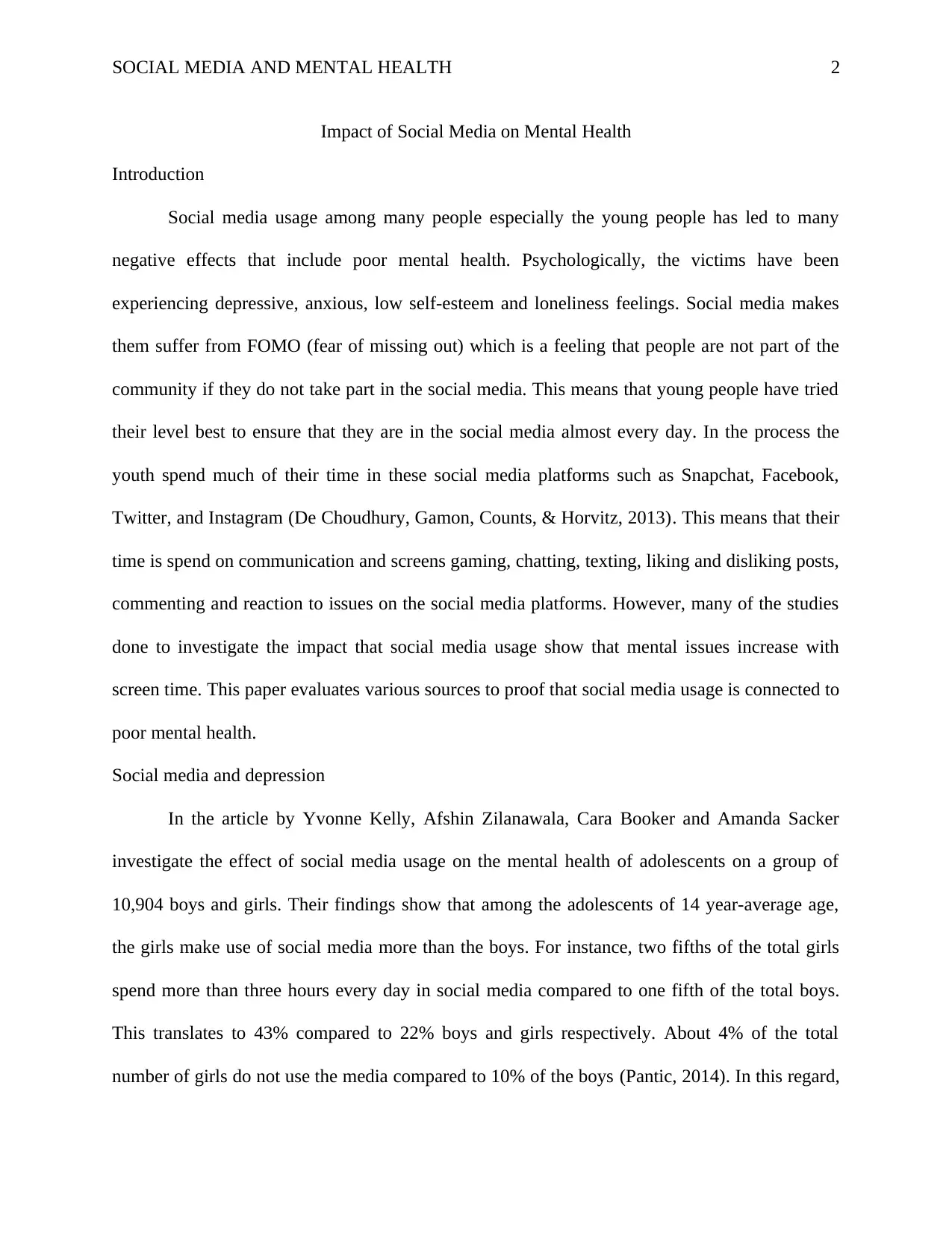
SOCIAL MEDIA AND MENTAL HEALTH 2
Impact of Social Media on Mental Health
Introduction
Social media usage among many people especially the young people has led to many
negative effects that include poor mental health. Psychologically, the victims have been
experiencing depressive, anxious, low self-esteem and loneliness feelings. Social media makes
them suffer from FOMO (fear of missing out) which is a feeling that people are not part of the
community if they do not take part in the social media. This means that young people have tried
their level best to ensure that they are in the social media almost every day. In the process the
youth spend much of their time in these social media platforms such as Snapchat, Facebook,
Twitter, and Instagram (De Choudhury, Gamon, Counts, & Horvitz, 2013). This means that their
time is spend on communication and screens gaming, chatting, texting, liking and disliking posts,
commenting and reaction to issues on the social media platforms. However, many of the studies
done to investigate the impact that social media usage show that mental issues increase with
screen time. This paper evaluates various sources to proof that social media usage is connected to
poor mental health.
Social media and depression
In the article by Yvonne Kelly, Afshin Zilanawala, Cara Booker and Amanda Sacker
investigate the effect of social media usage on the mental health of adolescents on a group of
10,904 boys and girls. Their findings show that among the adolescents of 14 year-average age,
the girls make use of social media more than the boys. For instance, two fifths of the total girls
spend more than three hours every day in social media compared to one fifth of the total boys.
This translates to 43% compared to 22% boys and girls respectively. About 4% of the total
number of girls do not use the media compared to 10% of the boys (Pantic, 2014). In this regard,
Impact of Social Media on Mental Health
Introduction
Social media usage among many people especially the young people has led to many
negative effects that include poor mental health. Psychologically, the victims have been
experiencing depressive, anxious, low self-esteem and loneliness feelings. Social media makes
them suffer from FOMO (fear of missing out) which is a feeling that people are not part of the
community if they do not take part in the social media. This means that young people have tried
their level best to ensure that they are in the social media almost every day. In the process the
youth spend much of their time in these social media platforms such as Snapchat, Facebook,
Twitter, and Instagram (De Choudhury, Gamon, Counts, & Horvitz, 2013). This means that their
time is spend on communication and screens gaming, chatting, texting, liking and disliking posts,
commenting and reaction to issues on the social media platforms. However, many of the studies
done to investigate the impact that social media usage show that mental issues increase with
screen time. This paper evaluates various sources to proof that social media usage is connected to
poor mental health.
Social media and depression
In the article by Yvonne Kelly, Afshin Zilanawala, Cara Booker and Amanda Sacker
investigate the effect of social media usage on the mental health of adolescents on a group of
10,904 boys and girls. Their findings show that among the adolescents of 14 year-average age,
the girls make use of social media more than the boys. For instance, two fifths of the total girls
spend more than three hours every day in social media compared to one fifth of the total boys.
This translates to 43% compared to 22% boys and girls respectively. About 4% of the total
number of girls do not use the media compared to 10% of the boys (Pantic, 2014). In this regard,
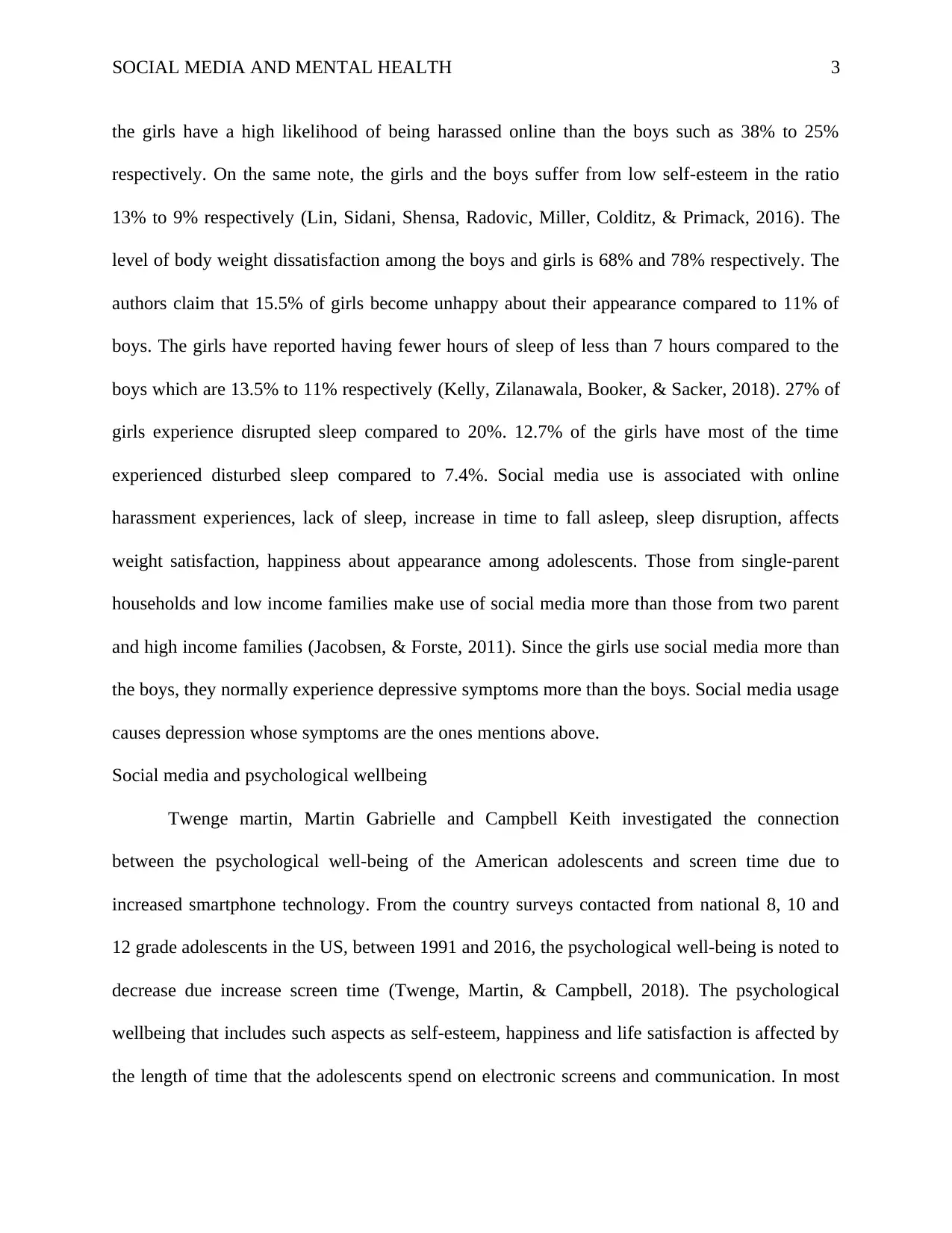
SOCIAL MEDIA AND MENTAL HEALTH 3
the girls have a high likelihood of being harassed online than the boys such as 38% to 25%
respectively. On the same note, the girls and the boys suffer from low self-esteem in the ratio
13% to 9% respectively (Lin, Sidani, Shensa, Radovic, Miller, Colditz, & Primack, 2016). The
level of body weight dissatisfaction among the boys and girls is 68% and 78% respectively. The
authors claim that 15.5% of girls become unhappy about their appearance compared to 11% of
boys. The girls have reported having fewer hours of sleep of less than 7 hours compared to the
boys which are 13.5% to 11% respectively (Kelly, Zilanawala, Booker, & Sacker, 2018). 27% of
girls experience disrupted sleep compared to 20%. 12.7% of the girls have most of the time
experienced disturbed sleep compared to 7.4%. Social media use is associated with online
harassment experiences, lack of sleep, increase in time to fall asleep, sleep disruption, affects
weight satisfaction, happiness about appearance among adolescents. Those from single-parent
households and low income families make use of social media more than those from two parent
and high income families (Jacobsen, & Forste, 2011). Since the girls use social media more than
the boys, they normally experience depressive symptoms more than the boys. Social media usage
causes depression whose symptoms are the ones mentions above.
Social media and psychological wellbeing
Twenge martin, Martin Gabrielle and Campbell Keith investigated the connection
between the psychological well-being of the American adolescents and screen time due to
increased smartphone technology. From the country surveys contacted from national 8, 10 and
12 grade adolescents in the US, between 1991 and 2016, the psychological well-being is noted to
decrease due increase screen time (Twenge, Martin, & Campbell, 2018). The psychological
wellbeing that includes such aspects as self-esteem, happiness and life satisfaction is affected by
the length of time that the adolescents spend on electronic screens and communication. In most
the girls have a high likelihood of being harassed online than the boys such as 38% to 25%
respectively. On the same note, the girls and the boys suffer from low self-esteem in the ratio
13% to 9% respectively (Lin, Sidani, Shensa, Radovic, Miller, Colditz, & Primack, 2016). The
level of body weight dissatisfaction among the boys and girls is 68% and 78% respectively. The
authors claim that 15.5% of girls become unhappy about their appearance compared to 11% of
boys. The girls have reported having fewer hours of sleep of less than 7 hours compared to the
boys which are 13.5% to 11% respectively (Kelly, Zilanawala, Booker, & Sacker, 2018). 27% of
girls experience disrupted sleep compared to 20%. 12.7% of the girls have most of the time
experienced disturbed sleep compared to 7.4%. Social media use is associated with online
harassment experiences, lack of sleep, increase in time to fall asleep, sleep disruption, affects
weight satisfaction, happiness about appearance among adolescents. Those from single-parent
households and low income families make use of social media more than those from two parent
and high income families (Jacobsen, & Forste, 2011). Since the girls use social media more than
the boys, they normally experience depressive symptoms more than the boys. Social media usage
causes depression whose symptoms are the ones mentions above.
Social media and psychological wellbeing
Twenge martin, Martin Gabrielle and Campbell Keith investigated the connection
between the psychological well-being of the American adolescents and screen time due to
increased smartphone technology. From the country surveys contacted from national 8, 10 and
12 grade adolescents in the US, between 1991 and 2016, the psychological well-being is noted to
decrease due increase screen time (Twenge, Martin, & Campbell, 2018). The psychological
wellbeing that includes such aspects as self-esteem, happiness and life satisfaction is affected by
the length of time that the adolescents spend on electronic screens and communication. In most
⊘ This is a preview!⊘
Do you want full access?
Subscribe today to unlock all pages.

Trusted by 1+ million students worldwide
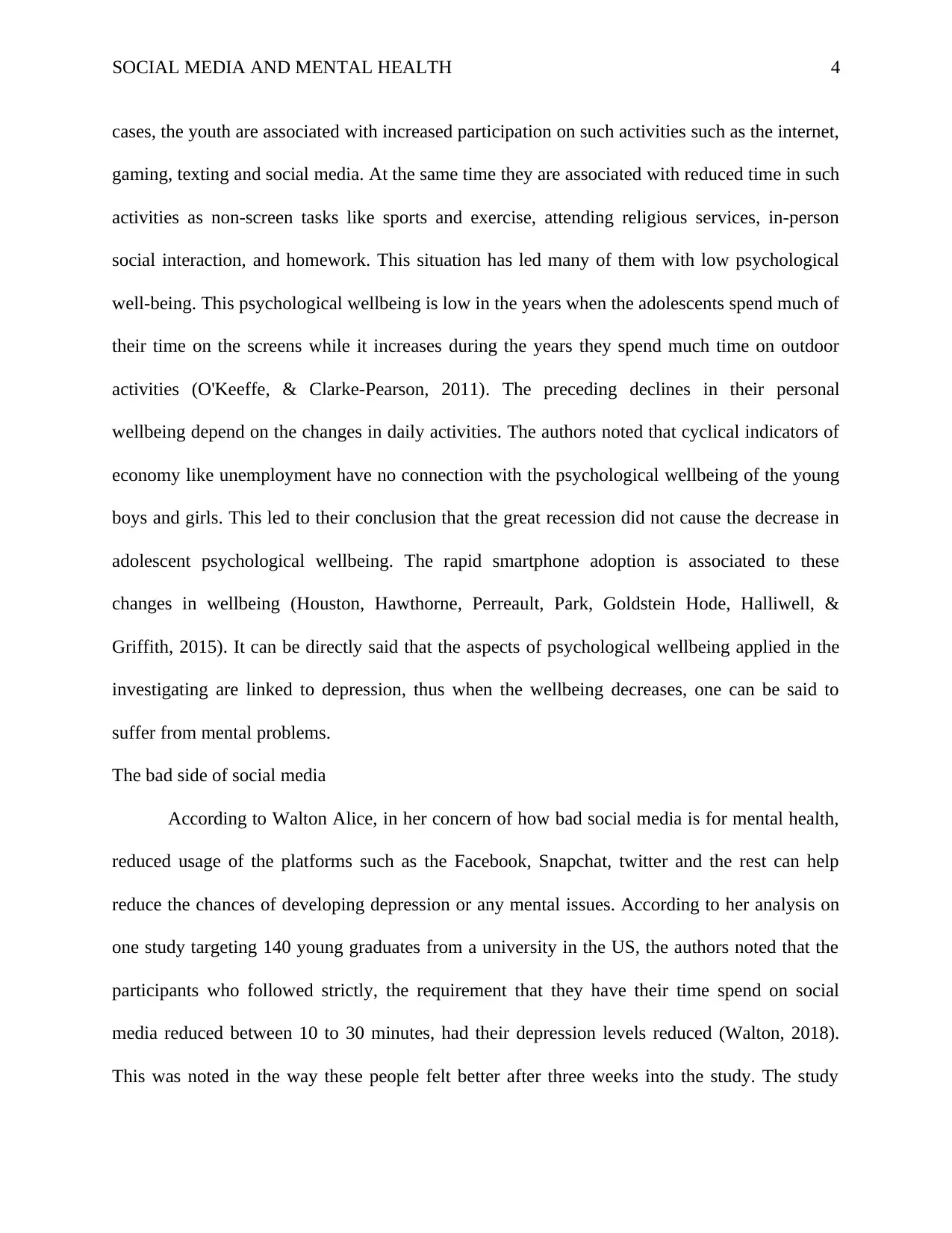
SOCIAL MEDIA AND MENTAL HEALTH 4
cases, the youth are associated with increased participation on such activities such as the internet,
gaming, texting and social media. At the same time they are associated with reduced time in such
activities as non-screen tasks like sports and exercise, attending religious services, in-person
social interaction, and homework. This situation has led many of them with low psychological
well-being. This psychological wellbeing is low in the years when the adolescents spend much of
their time on the screens while it increases during the years they spend much time on outdoor
activities (O'Keeffe, & Clarke-Pearson, 2011). The preceding declines in their personal
wellbeing depend on the changes in daily activities. The authors noted that cyclical indicators of
economy like unemployment have no connection with the psychological wellbeing of the young
boys and girls. This led to their conclusion that the great recession did not cause the decrease in
adolescent psychological wellbeing. The rapid smartphone adoption is associated to these
changes in wellbeing (Houston, Hawthorne, Perreault, Park, Goldstein Hode, Halliwell, &
Griffith, 2015). It can be directly said that the aspects of psychological wellbeing applied in the
investigating are linked to depression, thus when the wellbeing decreases, one can be said to
suffer from mental problems.
The bad side of social media
According to Walton Alice, in her concern of how bad social media is for mental health,
reduced usage of the platforms such as the Facebook, Snapchat, twitter and the rest can help
reduce the chances of developing depression or any mental issues. According to her analysis on
one study targeting 140 young graduates from a university in the US, the authors noted that the
participants who followed strictly, the requirement that they have their time spend on social
media reduced between 10 to 30 minutes, had their depression levels reduced (Walton, 2018).
This was noted in the way these people felt better after three weeks into the study. The study
cases, the youth are associated with increased participation on such activities such as the internet,
gaming, texting and social media. At the same time they are associated with reduced time in such
activities as non-screen tasks like sports and exercise, attending religious services, in-person
social interaction, and homework. This situation has led many of them with low psychological
well-being. This psychological wellbeing is low in the years when the adolescents spend much of
their time on the screens while it increases during the years they spend much time on outdoor
activities (O'Keeffe, & Clarke-Pearson, 2011). The preceding declines in their personal
wellbeing depend on the changes in daily activities. The authors noted that cyclical indicators of
economy like unemployment have no connection with the psychological wellbeing of the young
boys and girls. This led to their conclusion that the great recession did not cause the decrease in
adolescent psychological wellbeing. The rapid smartphone adoption is associated to these
changes in wellbeing (Houston, Hawthorne, Perreault, Park, Goldstein Hode, Halliwell, &
Griffith, 2015). It can be directly said that the aspects of psychological wellbeing applied in the
investigating are linked to depression, thus when the wellbeing decreases, one can be said to
suffer from mental problems.
The bad side of social media
According to Walton Alice, in her concern of how bad social media is for mental health,
reduced usage of the platforms such as the Facebook, Snapchat, twitter and the rest can help
reduce the chances of developing depression or any mental issues. According to her analysis on
one study targeting 140 young graduates from a university in the US, the authors noted that the
participants who followed strictly, the requirement that they have their time spend on social
media reduced between 10 to 30 minutes, had their depression levels reduced (Walton, 2018).
This was noted in the way these people felt better after three weeks into the study. The study
Paraphrase This Document
Need a fresh take? Get an instant paraphrase of this document with our AI Paraphraser
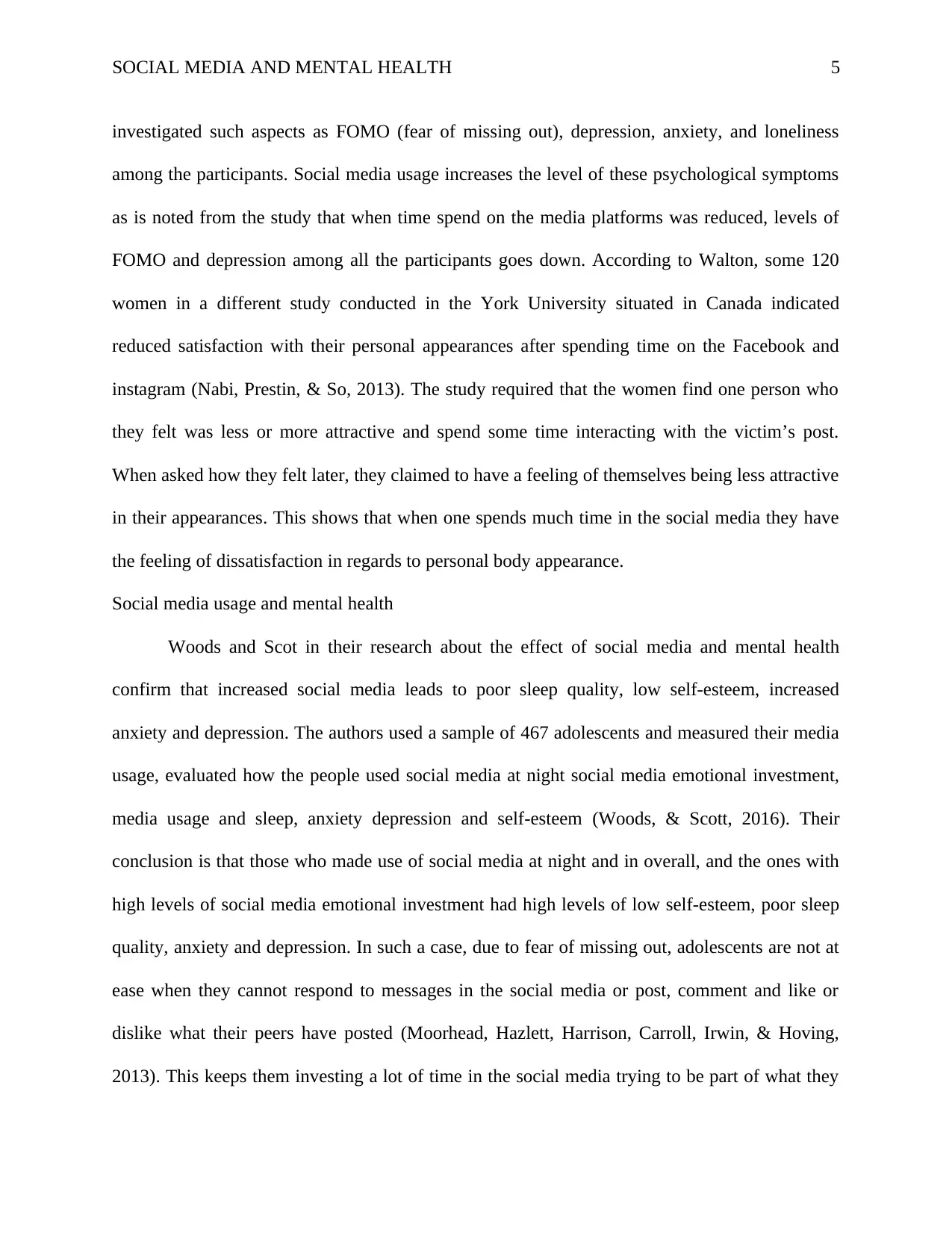
SOCIAL MEDIA AND MENTAL HEALTH 5
investigated such aspects as FOMO (fear of missing out), depression, anxiety, and loneliness
among the participants. Social media usage increases the level of these psychological symptoms
as is noted from the study that when time spend on the media platforms was reduced, levels of
FOMO and depression among all the participants goes down. According to Walton, some 120
women in a different study conducted in the York University situated in Canada indicated
reduced satisfaction with their personal appearances after spending time on the Facebook and
instagram (Nabi, Prestin, & So, 2013). The study required that the women find one person who
they felt was less or more attractive and spend some time interacting with the victim’s post.
When asked how they felt later, they claimed to have a feeling of themselves being less attractive
in their appearances. This shows that when one spends much time in the social media they have
the feeling of dissatisfaction in regards to personal body appearance.
Social media usage and mental health
Woods and Scot in their research about the effect of social media and mental health
confirm that increased social media leads to poor sleep quality, low self-esteem, increased
anxiety and depression. The authors used a sample of 467 adolescents and measured their media
usage, evaluated how the people used social media at night social media emotional investment,
media usage and sleep, anxiety depression and self-esteem (Woods, & Scott, 2016). Their
conclusion is that those who made use of social media at night and in overall, and the ones with
high levels of social media emotional investment had high levels of low self-esteem, poor sleep
quality, anxiety and depression. In such a case, due to fear of missing out, adolescents are not at
ease when they cannot respond to messages in the social media or post, comment and like or
dislike what their peers have posted (Moorhead, Hazlett, Harrison, Carroll, Irwin, & Hoving,
2013). This keeps them investing a lot of time in the social media trying to be part of what they
investigated such aspects as FOMO (fear of missing out), depression, anxiety, and loneliness
among the participants. Social media usage increases the level of these psychological symptoms
as is noted from the study that when time spend on the media platforms was reduced, levels of
FOMO and depression among all the participants goes down. According to Walton, some 120
women in a different study conducted in the York University situated in Canada indicated
reduced satisfaction with their personal appearances after spending time on the Facebook and
instagram (Nabi, Prestin, & So, 2013). The study required that the women find one person who
they felt was less or more attractive and spend some time interacting with the victim’s post.
When asked how they felt later, they claimed to have a feeling of themselves being less attractive
in their appearances. This shows that when one spends much time in the social media they have
the feeling of dissatisfaction in regards to personal body appearance.
Social media usage and mental health
Woods and Scot in their research about the effect of social media and mental health
confirm that increased social media leads to poor sleep quality, low self-esteem, increased
anxiety and depression. The authors used a sample of 467 adolescents and measured their media
usage, evaluated how the people used social media at night social media emotional investment,
media usage and sleep, anxiety depression and self-esteem (Woods, & Scott, 2016). Their
conclusion is that those who made use of social media at night and in overall, and the ones with
high levels of social media emotional investment had high levels of low self-esteem, poor sleep
quality, anxiety and depression. In such a case, due to fear of missing out, adolescents are not at
ease when they cannot respond to messages in the social media or post, comment and like or
dislike what their peers have posted (Moorhead, Hazlett, Harrison, Carroll, Irwin, & Hoving,
2013). This keeps them investing a lot of time in the social media trying to be part of what they
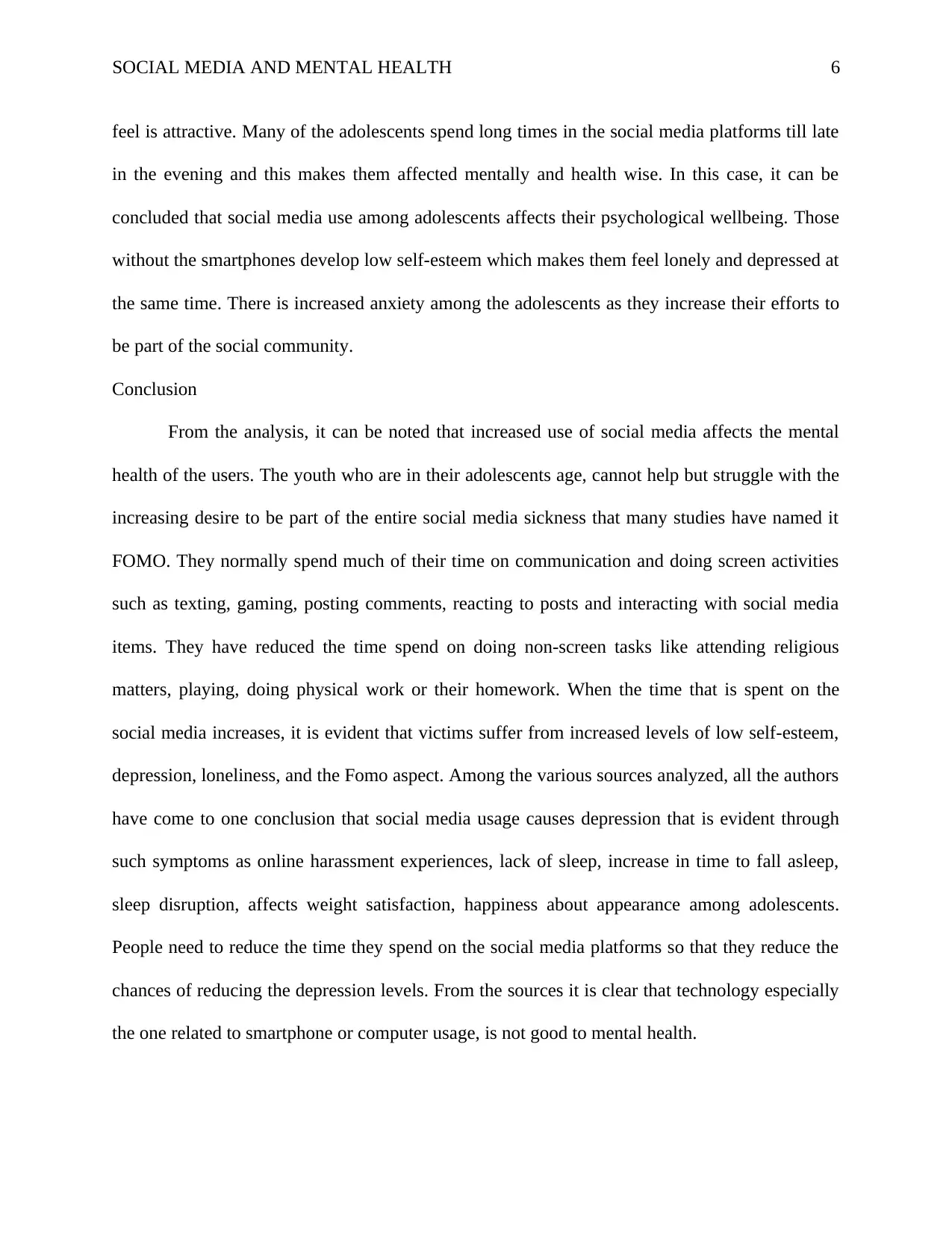
SOCIAL MEDIA AND MENTAL HEALTH 6
feel is attractive. Many of the adolescents spend long times in the social media platforms till late
in the evening and this makes them affected mentally and health wise. In this case, it can be
concluded that social media use among adolescents affects their psychological wellbeing. Those
without the smartphones develop low self-esteem which makes them feel lonely and depressed at
the same time. There is increased anxiety among the adolescents as they increase their efforts to
be part of the social community.
Conclusion
From the analysis, it can be noted that increased use of social media affects the mental
health of the users. The youth who are in their adolescents age, cannot help but struggle with the
increasing desire to be part of the entire social media sickness that many studies have named it
FOMO. They normally spend much of their time on communication and doing screen activities
such as texting, gaming, posting comments, reacting to posts and interacting with social media
items. They have reduced the time spend on doing non-screen tasks like attending religious
matters, playing, doing physical work or their homework. When the time that is spent on the
social media increases, it is evident that victims suffer from increased levels of low self-esteem,
depression, loneliness, and the Fomo aspect. Among the various sources analyzed, all the authors
have come to one conclusion that social media usage causes depression that is evident through
such symptoms as online harassment experiences, lack of sleep, increase in time to fall asleep,
sleep disruption, affects weight satisfaction, happiness about appearance among adolescents.
People need to reduce the time they spend on the social media platforms so that they reduce the
chances of reducing the depression levels. From the sources it is clear that technology especially
the one related to smartphone or computer usage, is not good to mental health.
feel is attractive. Many of the adolescents spend long times in the social media platforms till late
in the evening and this makes them affected mentally and health wise. In this case, it can be
concluded that social media use among adolescents affects their psychological wellbeing. Those
without the smartphones develop low self-esteem which makes them feel lonely and depressed at
the same time. There is increased anxiety among the adolescents as they increase their efforts to
be part of the social community.
Conclusion
From the analysis, it can be noted that increased use of social media affects the mental
health of the users. The youth who are in their adolescents age, cannot help but struggle with the
increasing desire to be part of the entire social media sickness that many studies have named it
FOMO. They normally spend much of their time on communication and doing screen activities
such as texting, gaming, posting comments, reacting to posts and interacting with social media
items. They have reduced the time spend on doing non-screen tasks like attending religious
matters, playing, doing physical work or their homework. When the time that is spent on the
social media increases, it is evident that victims suffer from increased levels of low self-esteem,
depression, loneliness, and the Fomo aspect. Among the various sources analyzed, all the authors
have come to one conclusion that social media usage causes depression that is evident through
such symptoms as online harassment experiences, lack of sleep, increase in time to fall asleep,
sleep disruption, affects weight satisfaction, happiness about appearance among adolescents.
People need to reduce the time they spend on the social media platforms so that they reduce the
chances of reducing the depression levels. From the sources it is clear that technology especially
the one related to smartphone or computer usage, is not good to mental health.
⊘ This is a preview!⊘
Do you want full access?
Subscribe today to unlock all pages.

Trusted by 1+ million students worldwide
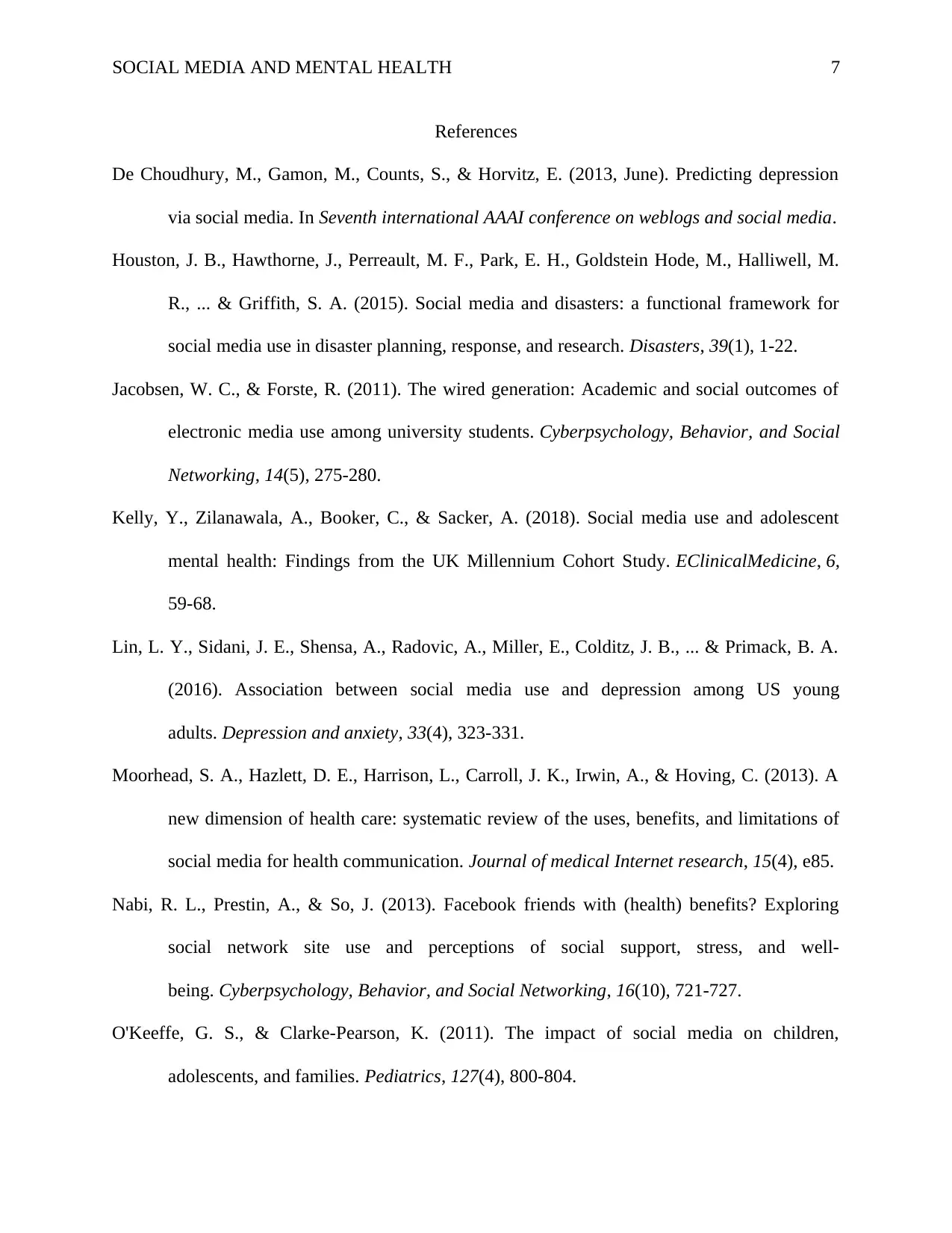
SOCIAL MEDIA AND MENTAL HEALTH 7
References
De Choudhury, M., Gamon, M., Counts, S., & Horvitz, E. (2013, June). Predicting depression
via social media. In Seventh international AAAI conference on weblogs and social media.
Houston, J. B., Hawthorne, J., Perreault, M. F., Park, E. H., Goldstein Hode, M., Halliwell, M.
R., ... & Griffith, S. A. (2015). Social media and disasters: a functional framework for
social media use in disaster planning, response, and research. Disasters, 39(1), 1-22.
Jacobsen, W. C., & Forste, R. (2011). The wired generation: Academic and social outcomes of
electronic media use among university students. Cyberpsychology, Behavior, and Social
Networking, 14(5), 275-280.
Kelly, Y., Zilanawala, A., Booker, C., & Sacker, A. (2018). Social media use and adolescent
mental health: Findings from the UK Millennium Cohort Study. EClinicalMedicine, 6,
59-68.
Lin, L. Y., Sidani, J. E., Shensa, A., Radovic, A., Miller, E., Colditz, J. B., ... & Primack, B. A.
(2016). Association between social media use and depression among US young
adults. Depression and anxiety, 33(4), 323-331.
Moorhead, S. A., Hazlett, D. E., Harrison, L., Carroll, J. K., Irwin, A., & Hoving, C. (2013). A
new dimension of health care: systematic review of the uses, benefits, and limitations of
social media for health communication. Journal of medical Internet research, 15(4), e85.
Nabi, R. L., Prestin, A., & So, J. (2013). Facebook friends with (health) benefits? Exploring
social network site use and perceptions of social support, stress, and well-
being. Cyberpsychology, Behavior, and Social Networking, 16(10), 721-727.
O'Keeffe, G. S., & Clarke-Pearson, K. (2011). The impact of social media on children,
adolescents, and families. Pediatrics, 127(4), 800-804.
References
De Choudhury, M., Gamon, M., Counts, S., & Horvitz, E. (2013, June). Predicting depression
via social media. In Seventh international AAAI conference on weblogs and social media.
Houston, J. B., Hawthorne, J., Perreault, M. F., Park, E. H., Goldstein Hode, M., Halliwell, M.
R., ... & Griffith, S. A. (2015). Social media and disasters: a functional framework for
social media use in disaster planning, response, and research. Disasters, 39(1), 1-22.
Jacobsen, W. C., & Forste, R. (2011). The wired generation: Academic and social outcomes of
electronic media use among university students. Cyberpsychology, Behavior, and Social
Networking, 14(5), 275-280.
Kelly, Y., Zilanawala, A., Booker, C., & Sacker, A. (2018). Social media use and adolescent
mental health: Findings from the UK Millennium Cohort Study. EClinicalMedicine, 6,
59-68.
Lin, L. Y., Sidani, J. E., Shensa, A., Radovic, A., Miller, E., Colditz, J. B., ... & Primack, B. A.
(2016). Association between social media use and depression among US young
adults. Depression and anxiety, 33(4), 323-331.
Moorhead, S. A., Hazlett, D. E., Harrison, L., Carroll, J. K., Irwin, A., & Hoving, C. (2013). A
new dimension of health care: systematic review of the uses, benefits, and limitations of
social media for health communication. Journal of medical Internet research, 15(4), e85.
Nabi, R. L., Prestin, A., & So, J. (2013). Facebook friends with (health) benefits? Exploring
social network site use and perceptions of social support, stress, and well-
being. Cyberpsychology, Behavior, and Social Networking, 16(10), 721-727.
O'Keeffe, G. S., & Clarke-Pearson, K. (2011). The impact of social media on children,
adolescents, and families. Pediatrics, 127(4), 800-804.
Paraphrase This Document
Need a fresh take? Get an instant paraphrase of this document with our AI Paraphraser
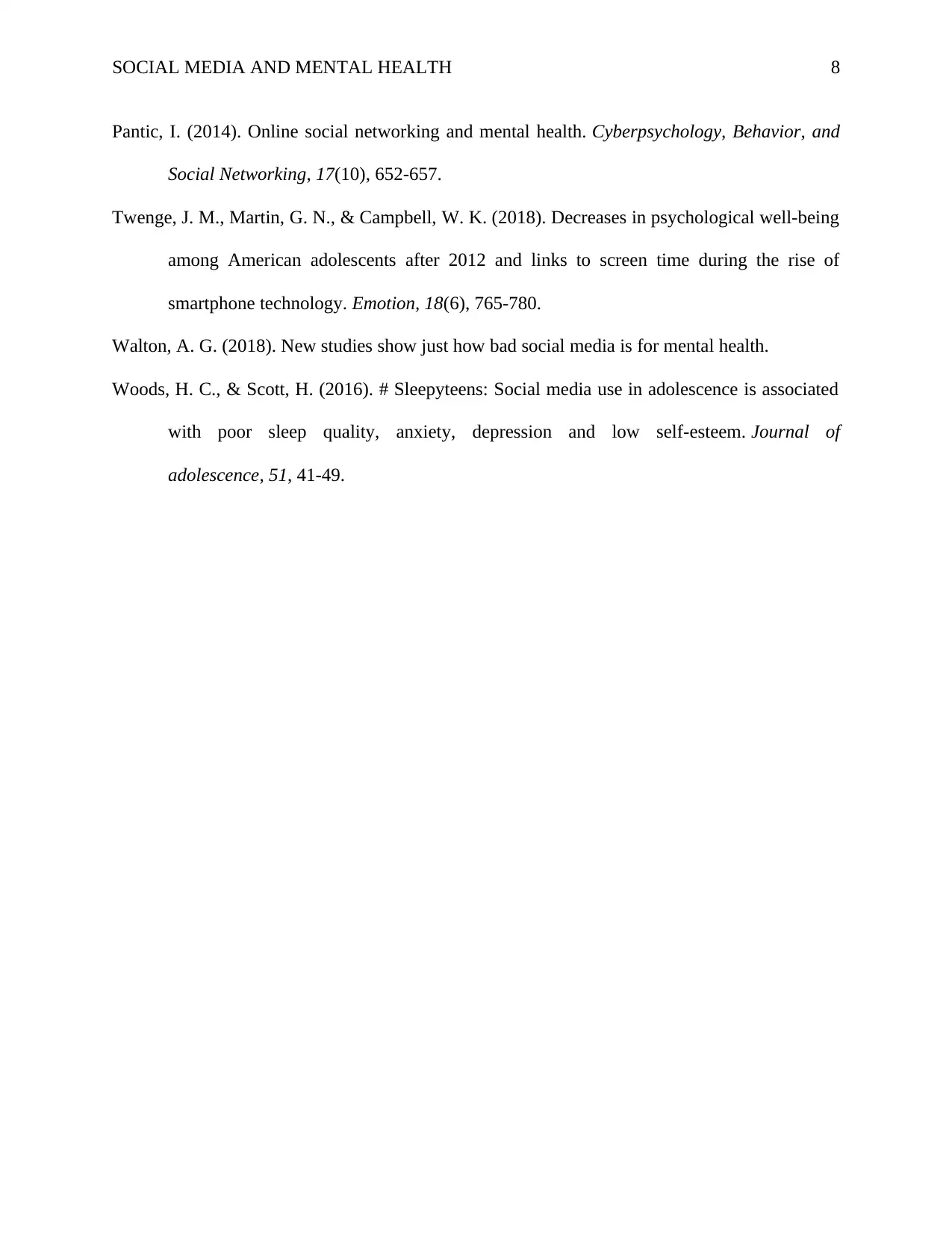
SOCIAL MEDIA AND MENTAL HEALTH 8
Pantic, I. (2014). Online social networking and mental health. Cyberpsychology, Behavior, and
Social Networking, 17(10), 652-657.
Twenge, J. M., Martin, G. N., & Campbell, W. K. (2018). Decreases in psychological well-being
among American adolescents after 2012 and links to screen time during the rise of
smartphone technology. Emotion, 18(6), 765-780.
Walton, A. G. (2018). New studies show just how bad social media is for mental health.
Woods, H. C., & Scott, H. (2016). # Sleepyteens: Social media use in adolescence is associated
with poor sleep quality, anxiety, depression and low self-esteem. Journal of
adolescence, 51, 41-49.
Pantic, I. (2014). Online social networking and mental health. Cyberpsychology, Behavior, and
Social Networking, 17(10), 652-657.
Twenge, J. M., Martin, G. N., & Campbell, W. K. (2018). Decreases in psychological well-being
among American adolescents after 2012 and links to screen time during the rise of
smartphone technology. Emotion, 18(6), 765-780.
Walton, A. G. (2018). New studies show just how bad social media is for mental health.
Woods, H. C., & Scott, H. (2016). # Sleepyteens: Social media use in adolescence is associated
with poor sleep quality, anxiety, depression and low self-esteem. Journal of
adolescence, 51, 41-49.
1 out of 8
Your All-in-One AI-Powered Toolkit for Academic Success.
+13062052269
info@desklib.com
Available 24*7 on WhatsApp / Email
![[object Object]](/_next/static/media/star-bottom.7253800d.svg)
Unlock your academic potential
Copyright © 2020–2026 A2Z Services. All Rights Reserved. Developed and managed by ZUCOL.
